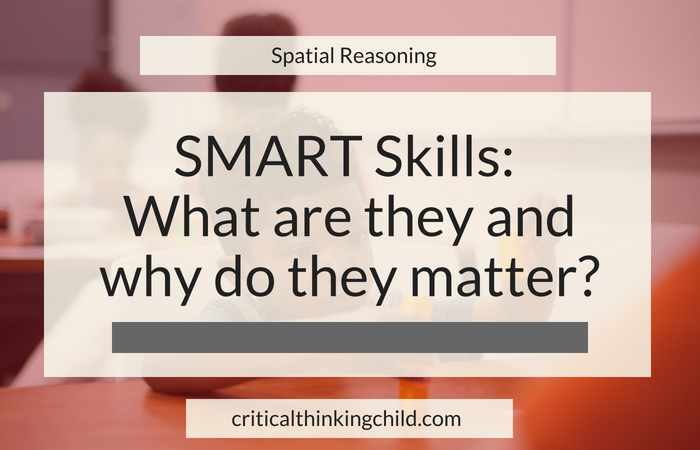SMART skills (spatial, math, analogy, reading, technology) encompass most of the content and skills that students will need to be successful in school. Here’s an overview of these skills and why they’re important.
You may have heard of STEM, but what about SMART? SMART skills (spatial, math, analogy, reading, technology) encompass most of the content and skills that students will need to develop critical thinking skills and be successful in school. Here’s a quick overview of these skills and why they’re important.
Spatial Skills
What are spatial skills?
Spatial skills refer to an understanding of where objects are in space, including oneself. It also refers to the ability to continue knowing where objects are in space even when they are manipulated or changed. You can help develop your child’s spatial skills through a variety of hands-on activities like puzzles and paper folding.
Why do spatial skills matter?
Strong spatial awareness has lifelong benefits. As an adult, when you navigate or use a map, you are relying on spatial skills. Similarly, when planning for furniture and decorating a home, you need strong spatial skills. These skills are what allow you to understand your place in the physical world, and how you fit into it.
Math Skills
What are math skills?
You might think of math as just numbers and operations like addition, subtraction, multiplication, and division, but it goes far deeper than that. Math also includes patterns, shapes and geometry, money, time, data and graphing, and number systems. Math skills are everywhere in the world around us, and as your child grows they will learn increasingly difficult math concepts at school. That said, you can improve math skills at home by creating real-world story problems using objects in your home.
Why do math skills matter?
Math skills are essential for real-world tasks like budgeting, making change, telling time, estimating, and cooking. Math may seem dry at times, but it’s so important that your children have strong math skills so that they are able to navigate the world independently as adults.
Analogy Skills
What are analogy skills?
You may think of analogy skills as skills to master for standardized tests like the ACT and the SAT. But the ability to understand the relationships between items and concepts becomes important long before your child is SAT age. Analogy questions challenge the mind, stretching reasoning and logic skills, and expanding vocabulary. The sooner your child begins to practice their analogy skills, the stronger their critical thinking will be.
Why do analogy skills matter?
Analogy skills like reasoning and logic are essential for any type of critical thinking or problem solving. Most workplaces will necessitate open-ended problem solving, so having the skills to think critically and logically about a task will be key for success in the workplace.
Reading Skills
What are reading skills?
Reading skills are not just letter/sound and phonics skills that help students read the words in books. They also refer to reading comprehension, or the ability to understand a text, and connections, the ability to connect a text to one’s own experiences, to another text, or to the world at large. As your child grows older they will read more complex texts.
Why do reading skills matter?
Reading skills are probably among the most important skills to nurture. Without the ability to read, comprehend, and connect, students will have difficulty succeeding. Reading skills are necessary for almost every other subject area, and once your child is an adult they will need to make sense of literature in job applications, news articles, and legal documents like lease agreements or car registrations. Reading skills are crucial to helping your child be an informed, active citizen.
Technology Skills
What are technology skills?
Technology skills include competency with tablets, laptops, desktops, and smartphones – as well as adaptability to any future technology that may not yet exist. These skills can include online research, social media safety, and word processing skills. In many schools, students are expected to meet technology standards as part of their regular curriculum; this is often referred to as “21st century learning.”
Why are technology skills important?
In our increasingly technological society, technology skills are essential for most jobs and for daily life. Students will need to be able to use smartphones for navigation, the cloud for file sharing, and spreadsheets for data analysis. They will also need to know about cybersecurity, and how to keep themselves safe from digital attacks. Scholars who are proficient or even advanced in their technology skills will be much more employable after they leave the school environment.
Nurture your child’s SMART Skills
Now that you know the basics of what SMART Skills are, it’s time to help your child nurture them! Our Critical Thinking Workbooks are designed to do exactly this – encouraging flexible, creative thinking and an understanding of all five SMART Skills. Through these workbooks you work alongside your child as they improve their test scores, develop a love of learning, and continue to expand their critical thinking skills.




Very useful. Thanks.